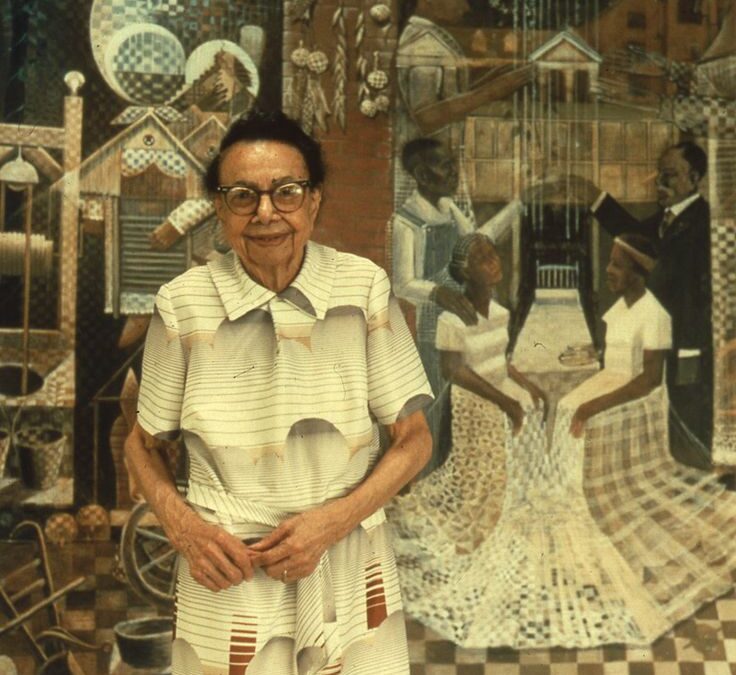Christia Adair in front of a mural about her life. Image from the Schlesinger Library at Harvard University, via the Texas State Historical Association.
Christia V. Daniels Adair
Born: 1893 in Victoria, TX
Died: 1989
Noted For: Christia Adair is an African-American suffragist and civil rights activist who helped bring about the end of whites-only primary elections in Texas.
The fight for voting rights in Texas is full of inspirational biographies. But not many are as remarkable as the life story of Christia Adair, a Houston activist who was both a suffragist AND civil rights leader. Let’s take a look at some of the amazing facts about Christia’s exceptional life:
Christia was both well-educated and an educator.
In 1910, Christia and her brother went to Austin to attend high school at Samuel Huston College, now Huston-Tillotson College. Christia’s godfather was one of the school’s co-founders. After high school, she attended Prairie View State Normal and Industrial College, which eventually became Prairie View A&M University. She later taught school in Jackson County, TX.
In addition to working for suffrage, Christia was part of a biracial group that opposed gambling.
In the suffrage era, many socially-conscious women were temperance (no alcohol) supporters and gambling opponents, believing that men’s excesses in these areas resulted in physical abuse of women, unplanned pregnancy, and diversion of household income away from dependent wives and children.
Warren G. Harding, the 29th president of the U.S., was a key “inspiration” for Christia’s activism.
In 1920, Christia and her husband were living in Kingsville, TX when presidential candidate Warren G. Harding made a campaign stop. After his speech, Harding reached over the group of African-American schoolchildren Christia had assembled to shake the hands of white audience members who were behind them. Christia never forgot it, and the incident served as a catalyst for her growing interest in civil rights.
She was executive secretary for the Houston chapter of the NAACP, an organization that played an important role in the Texas civil rights movement.
In 1940, the Houston NAACP filed a lawsuit on behalf of one its officers, Dr. Lonnie Smith, who had been denied a ballot in Texas’s all-white Democratic primary election. Smith v. Allwright eventually made it way to the U.S. Supreme Court, where it was successfully argued by NAACP lawyer Thurgood Marshall, who later became the court’s first African-American justice. The victory spelled the death of segregated primaries in the U.S., an important civil rights victory that had far-reaching implications throughout the South.
Christia was involved in the Smith case and another important NAACP case that happened a few years later, which related to the attempted seizure of NAACP membership records, a request with which Christia refused to comply. At the resulting trial, she was subjected to intense questioning over a 17-day period. During this era, the Houston NAACP became the target of threats of violence, prompting Christia to take measures to protect her safety.
She helped bring about a number of important civil rights victories in Houston.
Christia’s activism was not limited to the famous NAACP court cases. She also took a role in campaigns to desegregate the Houston airport, library, golf courses, veteran’s hospital, city buses and department stores. (She once insisted on using a department store’s “white only” dressing room). Additionally, Christia was a part of efforts to open up jury service to black Texans, as well as efforts to create equal hiring opportunities for county jobs.
She was one of the first African-American judges in Harris County.
Christia served as a precinct judge of Houston’s third ward, a (now-historic) region located outside of downtown Houston. She was also one of the first black women in Harris County to vote in a Democratic primary and the first African-American woman elected to the state Democratic committee—a position she later declined after the state party initially refused to seat the integrated Harris County delegation, an organization that Christia founded.
Christia received a number of honors for her work for women’s and civil rights.
In addition to being inducted into the Texas Women’s Hall of Fame, Christia was included in the “Library of History of Women in America”, an oral history of black women published by the Radcliffe Institute. She was also honored by the Houston chapter of the National Organization for Women.
There is a very cool park in Houston named in her honor, too.
On Christia’s 84th birthday, Harris County dedicated Christia Adair Park, a beautiful outdoor space that features a mural by civil rights artist John Biggers depicting Christia’s life and accomplishments. There is also a history exhibit housed in the park’s meeting room.
Additional Reading:
“Black Texas Women: 150 Years of Trial and Triumph” by Ruthe Winegarten, Janet G. Humphrey & Frieda Werden

